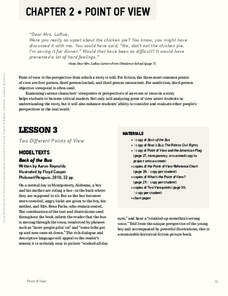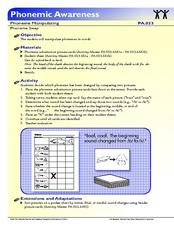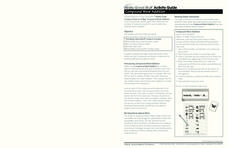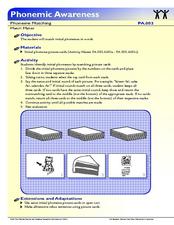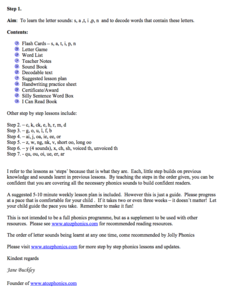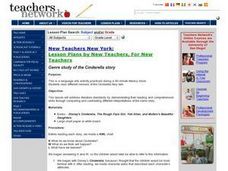Curated OER
Dr. Seuss Comes to the Gym
Demonstrate different motor activities to honor Dr. Seuss's birthday. A literacy-based physical education lesson plan prompts young readers to perform group activities such as tumbling, jumping rope, throwing frisbees, and hopping. Each...
Florida Center for Reading Research
Vocabulary: Words in Context, Meaning Maker
Support children with finding meaning in unknown words using this graphic organizer. While reading a piece of writing, learners identify unfamiliar words, using context clues and reference materials to find and record definitions before...
Math Learning Center
Second Grade Assessments and Scoring Checklists, Common Core State Standards
How are your second graders progressing in their math skills? Find out with a series of math assessment activities. With baseline assessment score sheets for each skill, you can track how well your kids are adding, subtracting, telling...
Lawrence Hall of Science
DIY Sun Science
Get an up-close-and personal look at the sun from the safety of your classroom with this fun science application. Offering numerous activities, images, and videos, the resource supports children of all ages as they learn about the sun.
Scholastic
Point of View
The point of view in a story can dramatically change the story itself. Focus on finding the points of view in various reading passages with a language arts packet, which includes fiction and nonfiction text.
Florida Center for Reading Research
Phonological Awareness: Phoneme Manipulating, Phoneme Swap
Reading readiness can be a fun skill to foster. Scholars manipulate phonemes to change one word into another. They pick picture cards, say the object's name on the card, then change the final phoneme to create a new word. They then find...
Texas Center for Learning Disabilities
Second-Grade Comprehension-Based Intervention
Help your youngsters find meaning in the text they read with this series of five intervention lessons. Offering explicit, step-by-step instructions for walking children through shared readings of leveled books, these...
Texas Center for Learning Disabilities
Teacher Templates
Letter by letter, sound by sound, monitor the growth of your emergent readers with these assessment templates. Adaptable to the needs of individual students, these one-on-one assessments focus on children's ability to identify letters...
Florida Center for Reading Research
Phonological Awareness: Phoneme Blending, What's My Word?
At a listening station, learners listen to a pre-recorded script; they follow the directions and number each picture on their picture chart corresponding to the segmented phonemes they hear.
Really Good Stuff
Compound Word Addition
Sometimes you can add two words together to make one longer word! Practice doing just this with your class with the worksheets and activities included here. The main goal here is to look at an image, name it, and figure out the two words...
Florida Center for Reading Research
Phonological Awareness: Phoneme Matching, Match Maker
Pre-readers identify and match initial phonemes. Scholars take turns choosing one card from each of the three stacks. They say the name of the image on the card, then keep whichever cards have a matching initial phoneme.
National Center for Families Learning
The Summer Fun Summer Learning Poetry Unit
Focus on poetry this summer to enhance those comprehension, fluency, and language skills with a set of resources intended to explore different types of poetry, specifically lyric poetry. The daily activities contain differentiation ideas...
Florida Center for Reading Research
Vocabulary: Word Analysis, Meaning Map
Lead young learners to understand new vocabulary with this series of word maps. The first of these organizers asks children to determine the definition and provide examples and descriptions of each word with the help of dictionaries,...
1 plus 1 plus 1 equals 1
I Can Read! Sight Words Set #18
Identify four sight words with an extensive reading packet. After kids learn the words under, new, was, and be, they work on tracing and finding the words in fun new ways.
Curated OER
Does it Measure Up?
Use this fun activity with youngsters learning how to use rules for measurement. Each is provided with six steps that direct them to draw specific things with specific heights or lengths. For example, they start by drawing a tree that is...
Google
Be Internet Awesome
Teach the qualities of a digitally smart citizen with a set of lesson plans created by Google. Along with creating strong passwords, learners explore how to protect their privacy, when to stand up for others against cyberbullying, and...
Curated OER
Phonological Awareness, Phoneme Manipulating, Phoneme Position Sort
Scholars make new words out of old ones by manipulating phonemes. Pupils mix and match initial, medial, and final phonemes to change words like cap into cup or head into bed.
Florida Center for Reading Research
Vocabulary: Word Meaning, Oh My Word!
Ever come across an unfamiliar word while reading and can't decipher its meaning? Use a worksheet and graphic organizer that tracks and helps bring meaning to unknown words as learners read a text. A worksheet and graphic organizer come...
A to Z Teacher Stuff
My Sound Book
Work with learners on a handful of letter sounds with a helpful language arts packet. The packet focuses on letters s, a, t, i, p, and n with tracing lessons and flash cards.
Curated OER
Acrobatic Clown
In this science investigation worksheet, students learn about balancing points and center of gravity by making a cardboard acrobatic clown using the directions and pattern provided.
Curated OER
Discovering Peace
Students explore vocabulary related to peace. In this peace lesson plan, students define the word "peace" and create a poem about peace. Students create a "peace quilt" as a follow-up activity.
Florida Center for Reading Research
Comprehension: Monitoring for Understanding, Simple Summary
Can your class sum up a text in a few sentences? Help them build this skill by starting nice and slow. For this summarizing activity, the teacher marks the main ideas with sticky notes. Learners read and reread the text, pausing at the...
Curated OER
My Senses Tell Me...
Students explore how to use their sense to draw conclusions. In this human biology lesson, students use their senses to observe various objects in learning centers. The centers include tasting salt, touching sandpaper, hearing bells and...
Curated OER
Genre Study of the Cinderella Story
Students interpret and compare different versions of the Cinderella story in this genre study. They complete KWL charts for each story beginning before listening and adding to the chart after the books are read aloud. Finally, they...






